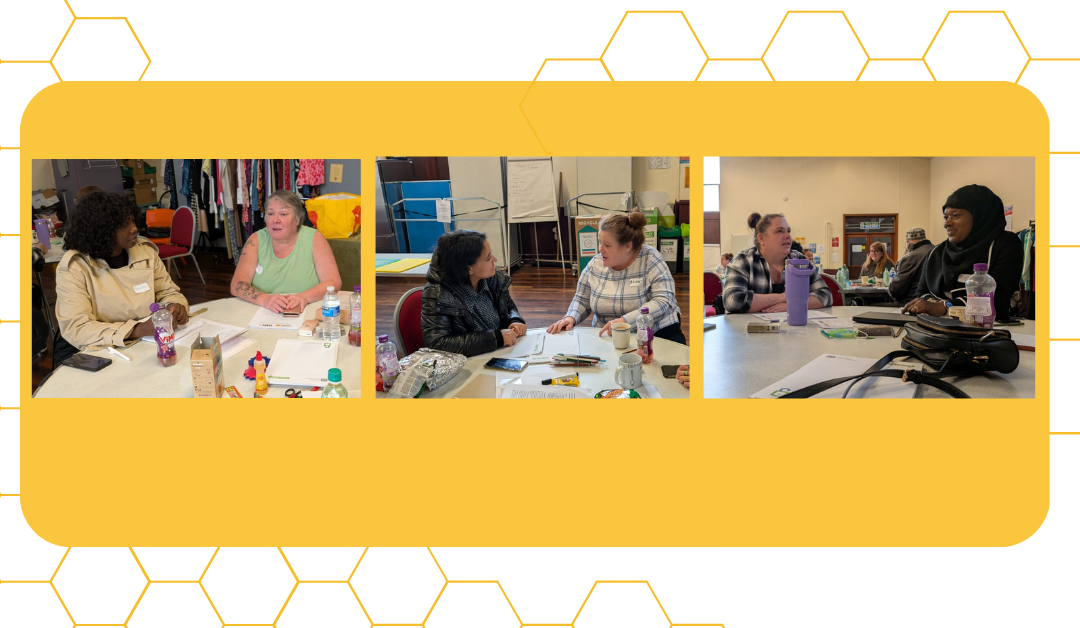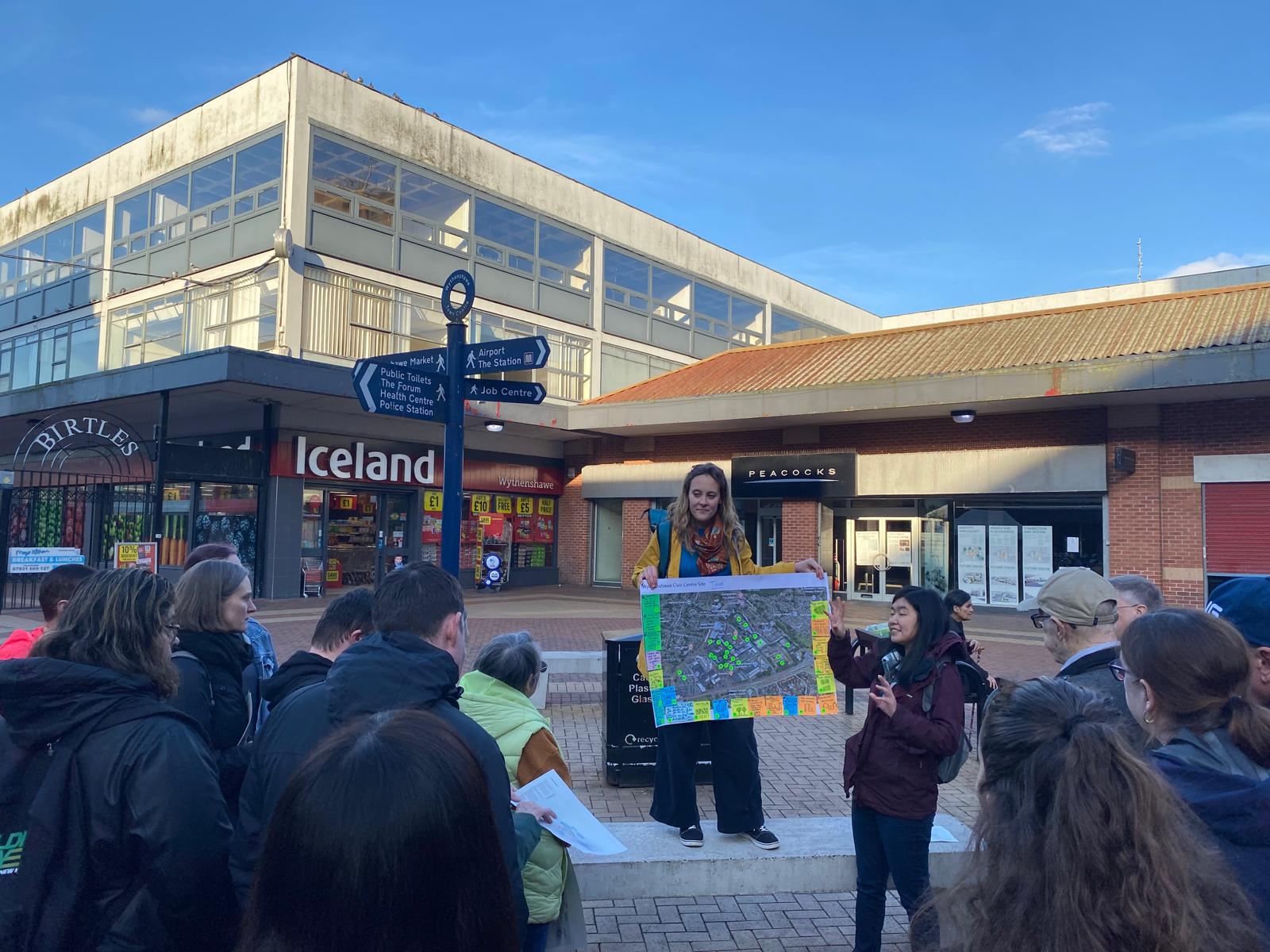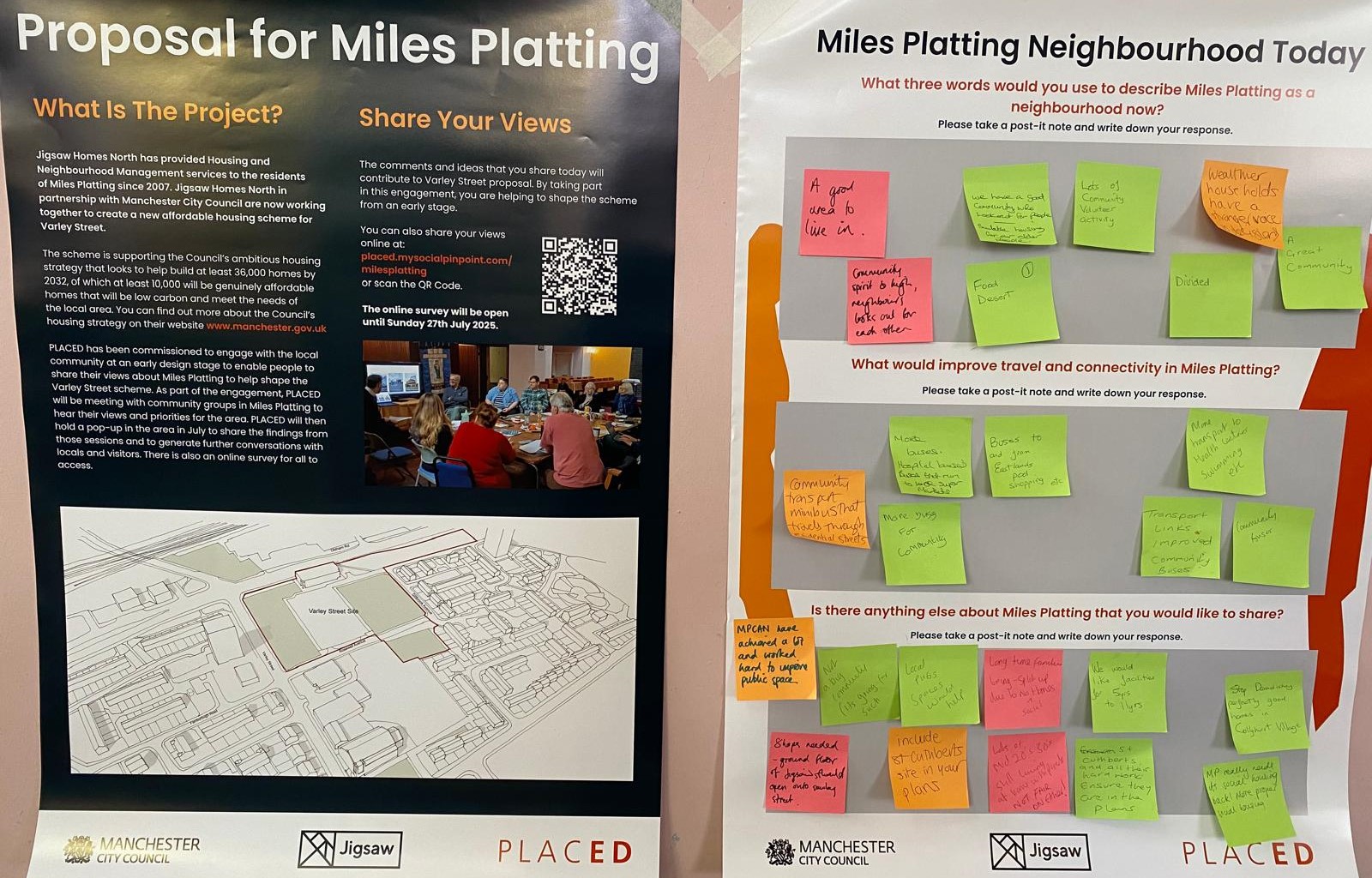GM Green Spaces Fund invests in Miles Platting Climate Action!

Over £400,000 has been awarded to 16 community-led projects in the latest round of the Greater Manchester Green Spaces Fund. Successful projects are providing access to better green space where it is needed most.
Miles Platting Community and Age Friendly Network (a Community Savers affiliate) are delighted to be one of the Round 3 grantees for their work to develop a wildlife corridor with support from Dr Jenna Ashton at the University of Manchester and a range of other partners:
“The Miles Platting Wildlife Corridor for people and nature will enhance identified spaces and create new habitats in the neighbourhoods of Miles Platting, Manchester. The aim is to improve biodiversity and the local ecosystem, increase interaction and connection between residents and their natural environment, mitigate impacts of climate change, and encourage physical activity between sites and along the Rochdale Canal.” (GMEF, 1Sept 2023)
Community groups who haven’t previously received funding can still apply for support from the Green Spaces Fund, with Round 4 now open.
Mayor of Greater Manchester, Andy Burnham, said:
“Everyone should have access to quality green space and the benefits that it offers our physical and mental health, but the reality is that some areas of Greater Manchester are worse off than others at present.
“That’s why I’m so pleased to welcome the latest intake of Green Spaces Fund projects, all of which seek to redress the balance. I continue to be amazed by the imagination and endeavour shown by community groups applying for support from fund – from green-fingered growers to champions of biodiversity, the projects that we have been able to back so far are really making a difference to their local areas.
“There’s still time to get backing from the fund, so if you have an idea for how to turn your local area green please do apply and help us make Greater Manchester a greener, fairer place.”
Read the full press release here.
Miles Platting Community and Age-friendly Network (MPCAN) established their Climate Action Group after community leaders came together with support from CLASS and URBED to map public and disused sites across their neighbourhood that was not yet earmarked for development and to create a shared vision for the future of the area in consultation with local residents.
Since then, leaders have identified a series of priorities including:
- the protection and improvement of green spaces and habitat creation for increased biodiversity;
- a community-led redevelopment of the St Cuthberts church site into a worship space and community hub in partnership with the Parochial Church Council.
- increasing the number of social homes available in the area after successive developments and a PFI regeneration programme left the community with a net loss of approximately 500 social homes.
Visit www.mpcan.org.uk to find out more and get involved!
Header image: “Swallows” by A Bird in the Hand Theatre at MPCAN’s climate resilience pageant in July 2023.
Introducing….
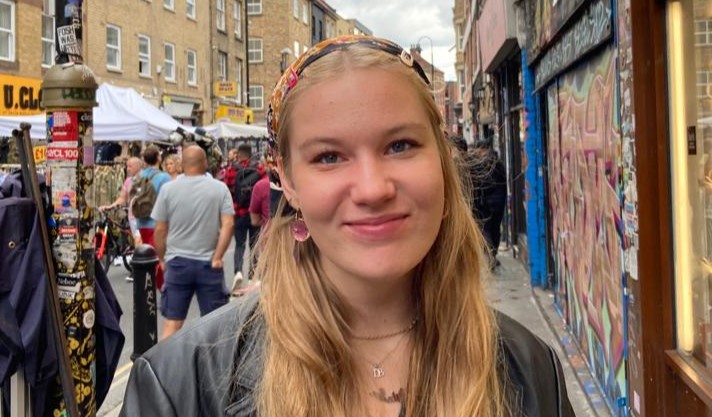
In this introductory blog, Ieva Pojuner tells us info about her role as Community Action Intern working with the Community Savers groups in Miles Platting.
Alongside my role within CLASS, I am a final year Social Anthropology and Sociology student at the University of Manchester. I spent the summer of 2022 as an intern with Greater Together Manchester, supporting a Social Super Market pilot project to tackle food poverty and food waste. This experience enlightened me about the strong sense of community that has been created by local residents and frontline workers in Miles Platting. I was eager to continue supporting those living in the area and across Manchester, which led me to the Community Action Internship with CLASS.
I have connected strongly with Community Savers as a women-led organisation after studying intersectionality and feminist theory. This really made me aware of how women face additional barriers in inequitable socioeconomic conditions. It has been inspiring to learn more about how these groups come together and support each other during these current times of economic and political uncertainty. I am looking forward to learning from these relationships throughout all my community action work this year.
My work with CLASS has particularly focused on the Miles Platting Community and Age Friendly Network (MPCAN). After a few months of working with action groups across Miles Platting, it has been eye-opening to learn how representatives from across the community congregate to think collectively and engage in collaborative ways. Communication is at the heart of these networks, and it has been a pleasure to begin supporting MPCAN to maintain this. I have really enjoyed getting to know key members of the community and hearing about their priorities for ongoing local developments. Being a part of these conversations and listening to such critical pieces of dialogue is something I am grateful for. Although it has only been a couple months, I have learnt a lot about what it takes for a community to build trust and positive social relations. Even when there may be setbacks, the individuals in this community can always come together to find meaningful resolutions.
As for 2023, I am looking forward to making progress with MPCAN regarding plans for a new social club in Miles Platting. I anticipate this project to be very rewarding as we continue to facilitate community consultations and create a space for residents to socialise and connect with one another. This development, once completed, will be enjoyed by future generations to come, and I am excited to support its journey through each stage.
“When we know each other, we build each other” – the power of international exchange.
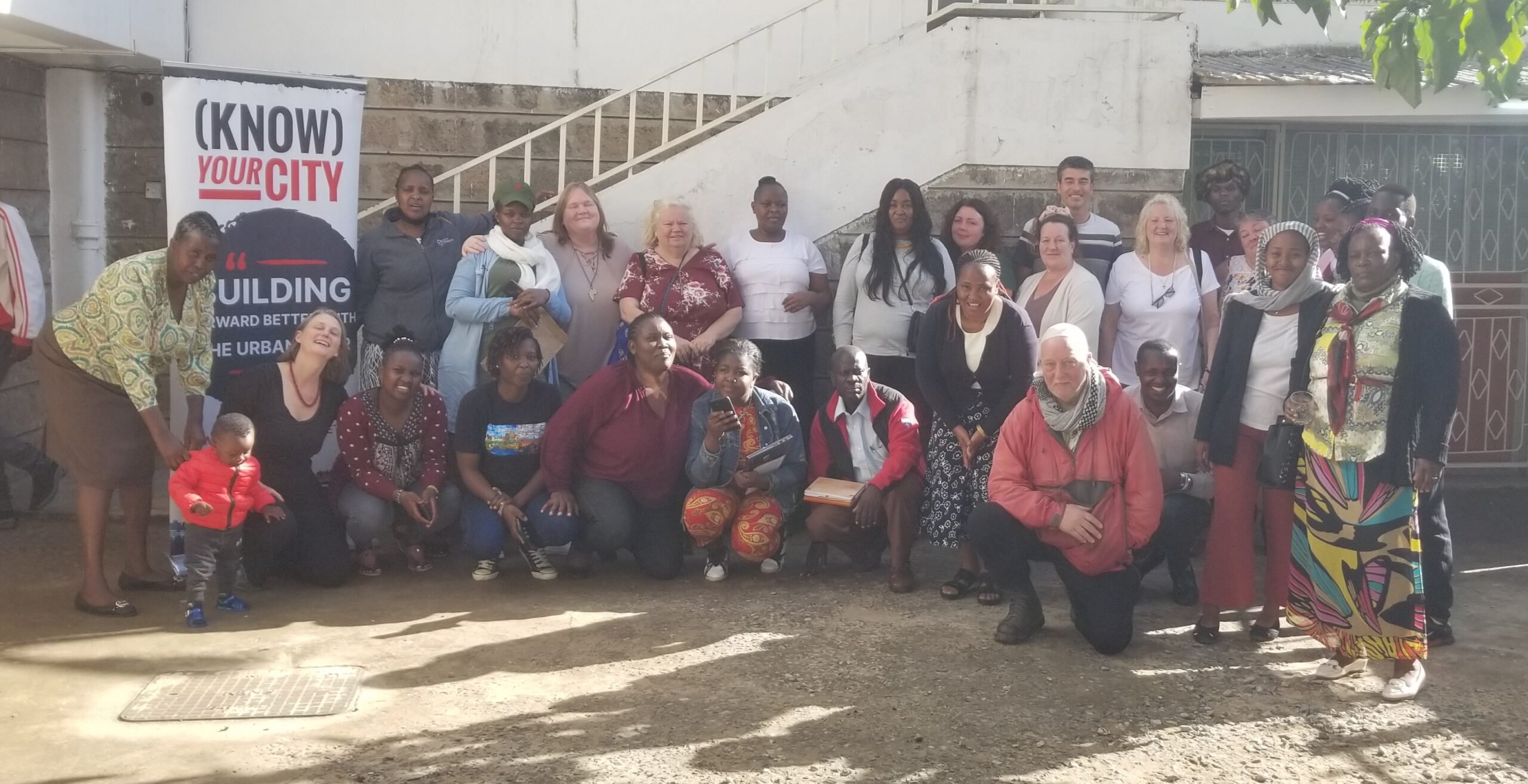
These were the words of Rashid, Chair of Muungano Wa Wanavijiji, at the opening session of a week-long international exchange in Nairobi between Muungano and Community Savers leaders from Manchester and Sheffield.
Rashid was sharing on the power of exchanges in the SDI tradition – a tradition that has been nurtured, tested, and adapted over more than thirty years, in 32 countries across the Global South.
November 2022 was a special month as Community Savers leaders were able to welcome activists from Nairobi here in the UK, share knowledge and learning on their adaptation of SDI/Muungano methodologies with postgraduate students in Manchester, and then travel to Nairobi to experience these approaches first hand; visiting settlements and exchanging learning with their sister federation.
Here we try to capture some highlights from a rich month of learning and inspiration…
“We Kenyans, and you from the UK, we are the same.”
Anastasia Wairimu is Chair of Akiba Mashinani Trust one of three organisations that make up the Muungano Alliance. After her second trip to the UK in November 2022 exchanging learning with Community Savers, she recognised that despite very different histories, low-income communities in the UK experience the same dynamics of exploitation and discrimination as informal settlement communities in Kenya.
Tina Cribbin is Chair of Aquarius Community Savers in Hulme, Manchester: these exchanges have enabled Tina and Anastasia to develop a strong relationship of trust and mutual respect, and Tina agreed with Anas’s observations. In particular, Tina noted the similarities in negative attitudes among those holding power and purse strings who judge low-income communities as criminal, as lazy, as a problem that needs fixing.

During her latest visit to the UK, Anastasia was shocked to see how older people are treated after visiting Hopton Court tower block in Hulme where 75% of tenants are aged Over-50 and many have long-term conditions, disabilities and mobility constraints. During their visit, the lifts were out of order again (a regular occurrence over the previous five years) and elderly people had been left with no way of getting out of the block or bringing food shopping up to their flats. Tenants shared how throughout the pandemic they had nowhere to meet with their neighbours due to the absence of a communal area at the block; and how elderly people are falling through the gaps between housing, health and social care services in ways which leave them unable to pay for food, heating or sometimes without appropriate end of life care.
During the Nairobi visit, Ellie and Sue from Miles Platting shared experiences of top-down regeneration and gentrification which resonated strongly with Muungano anti-eviction activists. Leaders reflected that although the extremity of the circumstances are very different the principle of top-down attempts to push lower-income groups away from the inner-city is the same.

During November, leaders from Miles Platting gave urban inequality students a tour of their neighbourhood. They explained to them how the Private Finance Initiative that was supposed to regenerate the area for the existing community has resulted in a net loss of approximately 500 social rental homes and the inflation of house prices and private rents far beyond a threshold that local working families can afford. This is leading to the breaking up of families and people on lower incomes being pushed out to other boroughs of Greater Manchester. Existing residents had agreed to the PFI (including compulsory purchase orders and demolitions) on the basis that a suite of community facilities would be built, including a joint services centre and leisure and retail facilities. In the end, none of this was delivered. The community are now calling on Manchester City Council to protect the public land that these community facilities were supposed to be constructed on for community benefit.

At our final reflection, Jonte shared how an elderly woman housing activist in Kambi Moto who has been involved in their community-led housing movement for over 30 years was amazed to learn that she can sit together with people from the UK, this developed country, and find that they are struggling against the same social issues and can learn from how communities have organised over land and housing in Nairobi.
“Saving is an act of resistance”
Community Savers have been holding learning exchanges with Muungano activists since 2017 and during November’s exchange in Nairobi, Tina explained to Anas that:
“What changed for me was about the savings: I used to feel like I don’t want to save, I want to spend. But you told me that every time you save it is an act of resistance and that has really changed it for me.”
Savings groups are the building blocks of a united and powerful community-led movement for poverty reduction and the transformation of urban social power relations. Tina’s group are now beginning to see the fruits of building power through savings as on return to the UK they had a meeting with the housing provider at Hopton Court (above). The provider issued an official apology for the experiences of older people at the block and announced that they will be replacing the lifts to ensure elderly people are never put in a situation of being trapped in the building again.

Aquarius Community Savers have also been able to build a new coalition of groups in their social housing estate who are coming together to form a new Aquarius Neighbourhood Forum including members of Hulme Tenants Union; Epping Park Warriors; Aquarius Tenants and Residents Association and Age-Friendly Hulme and Moss Side. They have worked closely with their local ward councillors to oppose a private development that would block the sunlight from Hopton Court gardens and put even more pressure on overburdened local services. They are now working with their councillors to request the rezoning of the Aquarius estate out of the city centre planning area and into the Inner South zone in support of a community-led plan for their thriving local community.
“Unity is our strength, Information is our power”
Muungano begin their meetings with call outs to their members “Unity? Is our strength! Information? Is our power!” During the final reflection at Muungano House on 25 November, Anastasia explained that:
“There are 43 tribes in Kenya, but at Muungano we know only two tribes: the haves and the have-nots”
Unity is critical to addressing this inequality.
We reflected on the importance of collective solutions and collective thinking. We discussed how in the UK people have become individual clients of government and service providers. Although it is good to have a social welfare system, it is provided in a way that has made people become passive. Tina observed that “it is given but it is never what you would have asked for. Now we are learning to ask for what we need.”
We reflected on the power of community data and also the value of university partnerships even though universities generally represent the “Haves”. Nicerah from Kibera shared how after she joined Muungano and began collecting data in her settlement, officials were asking her “How can you know how to make these survey questions on your own? What university did you go to?” Nicerah was able to tell them “My University is Muungano”.
Emily, a national leader from Mathare, explained how at the same time, Muungano has developed partnerships with university departments and their students. Students can help them to collect data and write up reports. This is not because the community cannot do it without their help, but it is about recognising that these students may be the next Planning Officer or Water and Sanitation official in the future: “If we teach them now, they may come back to us in the future”.
Validation is a critical step in the process: presenting the data collected back to the community through public meetings to enable them to correct inaccuracies and build a sense of ownership over the information and the change that the information makes possible.
Earlier in the week, as we began our learning exchange, Nancy explained that data collection underpins everything for Muungano: “we have to know ourselves” and this is the principle underpinning Know Your City TV…
Know Your City TV: “We can change the story”
One of the most inspiring engagements for UK activists during their week in Nairobi was with the Youth Federation leaders involved in data collection, advocacy, and Know Your City TV.
Through KYCTV young people are engaged in community action by creating opportunities for them to learn skills they are interested in like film-making and photography while leaders also engage youth through art, music and sports.
The UK team took home the principle of “Just One” – you only need one engaged young person to start a youth movement. That one person will be able to engage other young people.
UK delegates were inspired by their inclusive approach involving arts and sports and participatory approaches and tools for engagement and planning – especially the Tree of Transformation which enabled young people in Mukuru to come together for visioning of the changes they wanted to see and the conditions that they needed to foster to achieve those changes.

Georgie from Arbourthorne asked the youth leaders what made them engage with Muungano and KYCTV as it can be hard to engage young people in the UK who say “nothing ever changes”. They explained that they grew up in the settlements and they saw politicians come and go with promises that they never delivered on. They recognised Muungano’s message that we have the solutions and we know our community best. We were tired of all the negative representations in the media and decided that with the training they were offering we can change the story.
Younger youths were inspired and motivated by older youth mentors who they looked up to. The older leaders explained that they put their trust in the young people to carry out data gathering and document Federation processes; and importantly they show them love and nurture them. The leaders focus on what the young people themselves are interested in and what they want to learn and: “Give them a chance to be who they are”.
They advised the UK team: “try to spot the ones with ambitions, start with them, find the youth that want change, show them the opportunities, show them a better way of life”.
Exchanges such as these between grassroots communities across different international contexts are critical for enabling communities to recognise their expertise and the commonalities of their experiences, struggles and strength within global and urban systems which act to exploit and oppress them. Yet they resist, they organise, and they grow stronger, smarter, and more effective through global solidarity networks: when they know each other, they build each other.
Community-led development and climate action in Miles Platting
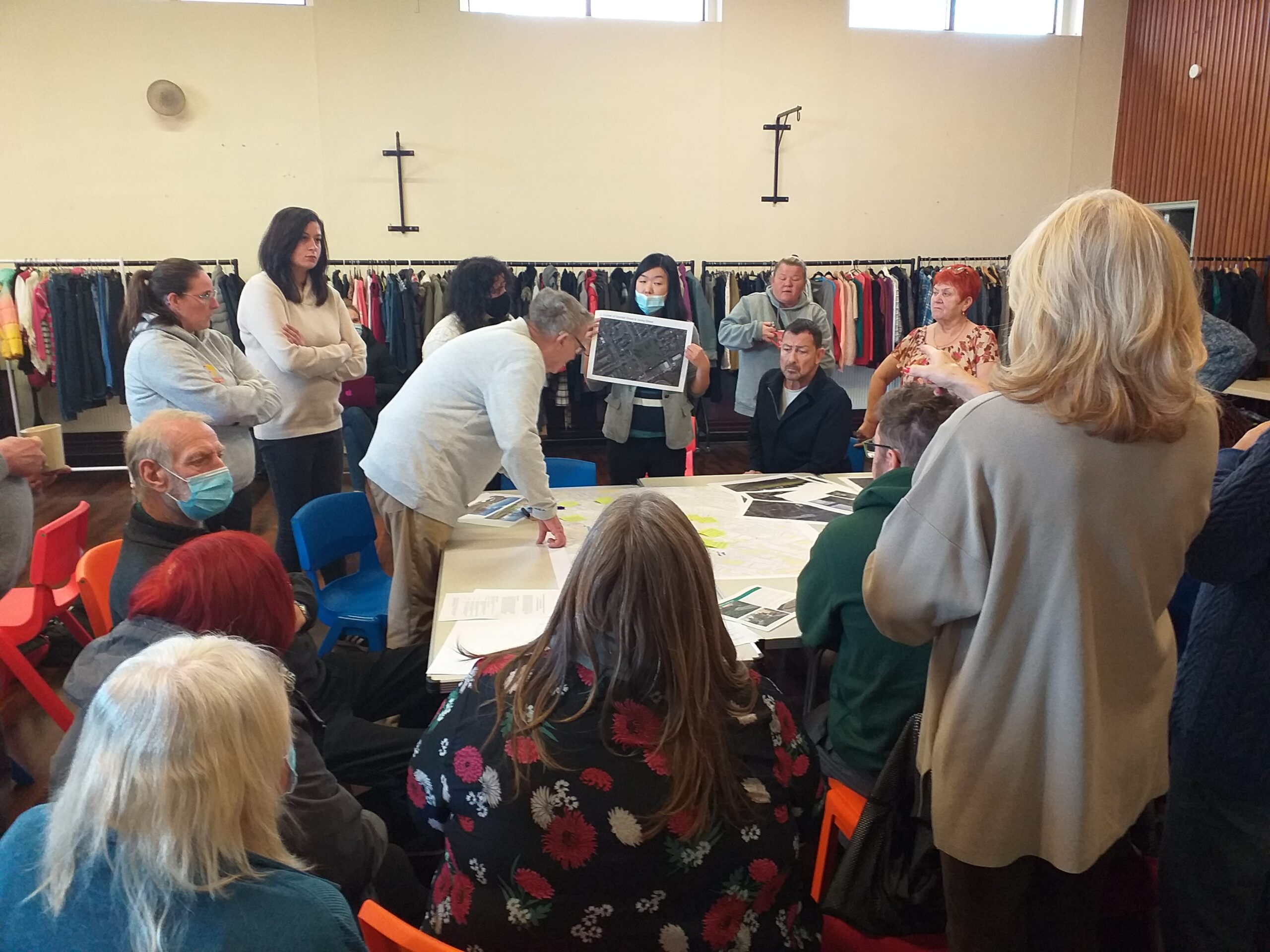
In 2019, members of Miles Platting Savers travelled to Nairobi, Kenya, for a five-day learning exchange with leaders of Muungano Wa Wanavijiji. Together with delegates from Sharston and Brinnington, they were inspired by the way that housing activists had brought their communities together to gather data, map their settlement and set priorities. From there, they worked with local government to ensure people’s needs were recognised and local services and infrastructure were improved. The Manchester groups visited community-led housing projects and community build schemes and saw how co-financing could achieve local ownership over community facilities, protecting and maintaining community assets.
On their return, Miles Platting Savers began to create a map of their neighbourhood tracing the history of their area and the positive and more challenging impacts of ongoing regeneration. This was undertaken with other local residents and members of Community Grocers, working with researchers from the University of Sheffield.
Community conversations revealed that there was widespread anxiety among residents about the rapid changes taking place around them. In response, in November 2019, Miles Platting Savers called a meeting of local community groups to explore how to work more effectively together and ensure local residents had regular access to information about the neighbourhood.
At this meeting, Miles Platting Community Network was born – strengthened in 2021 by a merger with Miles Platting Age-friendly Neighbourhoods Board to become:
Miles Platting Community & Age-friendly Network: MP-CAN!
In just three years, and in the midst of multiple crises, this collective of local community leaders has achieved amazing things together. Here’s a snapshot of their brilliant community action…
Miles Platting PFI: a brief history
To understand how and why MPCAN have become such a force for good in their neighbourhood, a brief history of the regeneration that residents have been living through is needed.
In March 2007, Manchester City Council (MCC) handed over the maintenance and management of nearly 3,000 homes in Miles Platting to the Renaissance Miles Platting consortium on a 30-year contract. Costing £160m in government funding, plus a comparable amount invested by the private sector (to be paid back to private investors over the 30-year contract period), the plan was to refurbish up to 1,500 council homes in the area and build an additional 1,000 homes for direct sale on the market, while demolishing 300 more as part of the redesign of the estate. Importantly – alongside the PFI contract – the council also developed a funding partnership for a Joint Services Centre including partners such as the NHS and Adactus Housing Association (now Jigsaw Homes). The centre was to include a range of NHS services, including three GP practices and a pharmacy, as well as a community hub incorporating: a new library, new sports facilities, advice and information services, services for young people, and spaces for community, recreation and leisure use.
The area at the intersection of Oldham Street and Varley Street was also intended to host retail facilities and a replacement swimming pool. The original swimming pool and library were demolished under the PFI regeneration.

Unfortunately, the 2008 financial crisis led to funding for the replacement community facilities being cut. The community were left with none of the community facilities that were supposed to be introduced and have to date experienced the demolition of 240 homes for social rent with only 22 replaced.
Happily, the council have retained ownership of the land where the joint services centre and community hub were supposed to be located. MPCAN are now advocating for the development of community facilities or housing for social rent on this site.
MPCAN in action 1: Data gathering, mapping and visioning
Within this context, the first stages of MPCAN’s work were to gather information about neighbourhood change over time and map out losses and new developments across the neighbourhood.
MPCAN were supported by URBED and CLASS to carry out a consultation with local residents about priorities for the area alongside existing plans under the PFI. This built on all the fantastic consultation and prioritising work carried out by the Age-Friendly Neighbourhoods board from 2016-2018.
URBED then supported leaders with mapping and land registry searches to identify which areas of Miles Platting were managed under the PFI contract and to understand land ownership and development plans on remaining sites.

This highlights residents’ priorities for the future of the neighbourhood and potential sites where new community facilities could be developed or community-led improvements could be made in partnership with local agencies and authorities.
MPCAN in action 2: Climate Action
From 2020, the momentum shifted to action and one of the first achievements of MPCAN was to successfully register Shetland Road Green as an Asset of Community Value with the City Council with support from local councillors.
This created the impetus to think in more depth about how to achieve the ‘improve our green spaces’ priority from the network vision. At an URBED-facilitated ‘Green Infrastructure’ workshop in November 2021 leaders established the MPCAN Climate Action Group (CAG) which has three key objectives:
- Conservation: ecological survey and ‘citizen science’ wildlife recording, followed by habitat creation and inter-linking
- Canal upgrading: cutting back and beautification of overgrown areas to encourage more walking and cycling; planter construction and wildflower planting to develop ‘green fingers’ into and out of the canal-way
- Protection, improvement and development of green and wild spaces including tree protection and planting, wildflower meadow patches and ‘rivers of flowers’ for bees and butterflies
Supported by Jenna Ashton (Creative Climate Resilience, University of Manchester) and Ash Farrah (MCC Climate Change Officer), the CAG have created a map of 20 green or disused sites across the area for surveying and potential improvements and have action-planned around five of these sites since February 2022.
Dot Lomax, a local resident and community leader explains:
“We do ‘neighbourhood walkabouts’ – so we go and visit somewhere and door-knock the houses around that site to chat with people about how it’s used and what people would like to see. It means we can meet people and let them know who we are as well – and then we make some plans for that site and ask people what they think.”

Members are now working with the Canal and River Trust, and Lancashire Wildlife Trust on ecology surveys and citizen science activities to identify local species and develop plans for appropriate habitat creation and wildlife corridors through the neighbourhood, and with Groundwork, Creative Climate Resilience project (University of Manchester), and Jigsaw Homes on green space improvements.
Ellie Trimble a local resident and Rector shares reflections on the first of these sessions led by Russell Hedley at Lancashire Wildlife Trust:
“It was so lovely spending time in one of our remaining green spaces as Russell completed an inventory of wildlife and native plants. We all learnt such a lot and had fun at the same time, especially our young families who ran around very excited to point out many different butterflies including some that Russell was very pleased to see so close to the city.
We learnt that some of the wildflowers that we thought were weeds are the reason we have so many butterflies which is great news as we all know weeding is hard work!
The children didn’t like the wasps that were swarming around one plant in the garden until we learnt that they were honeybees which was amazing and far more welcome. What is even more amazing, is that since that event, some of the children have been visiting the garden every evening to water the plants.”
Ash Farrah, Climate Change Officer for Manchester City Council shared:
“It’s a pleasure to support the MP-CAN Climate Action Group, the commitment and enthusiasm from the group’s members is clear to see at every meeting. To my knowledge, MP-CAN CAG is the only climate-focused community group in all of North Manchester. They are leading the way.”
MPCAN in action 3: St Cuthberts Action Group
This group was established by St Cuthbert’s Parochial Church Council after a long process of assessment and reflection within the church concluded that the building was in too great a state of disrepair and needed to be redeveloped.
The PCC resolved to work in partnership with MPCAN leaders and local residents on a community-led redevelopment of the St Cuthberts site. The PCC aim to retain a space for worship while achieving their Mission Action Plan to nurture and support their parishioners and the local community, especially in matters of social justice and reducing deprivation and exclusion.
The early stages of this work are being match-funded by The National Lottery Community Fund and an invitation to tender for project management services has recently been advertised.
The first step will be an extensive neighbourhood-wide consultation on the facilities that local residents would most value and ensuring that as diverse a set of residents as possible are able to share their ideas and any anxieties or concerns.
Leaders from the action group are now going out on visits to community hubs and mixed-use social centres across Manchester to gather ideas and inspiration. Most recently, they had a fantastic visit to The Carlton Club in Whalley Range to learn about the journey of initiating and developing a community-run social venue. MPCAN are looking forward to a long and fruitful relationship with committee members at the Carlton Club and hopefully many others along the way who can offer guidance and moral support as they embark on their own exciting project!

Anne Worthington, a long-term resident and community leader said:
“I think the work MPCAN is doing with regards to the St Cuthberts site is SO important. With the support of the PCC, we hope that along with a space for worship, a valuable community social space can be created to replace the existing church building which is sadly in poor shape. Visiting other community ventures is really inspiring.”
If you would like to find out more or connect with MPCAN please email: milesplattingcommunitynetwork@gmail.com.
Women Thriving: a transformative year for Community Savers
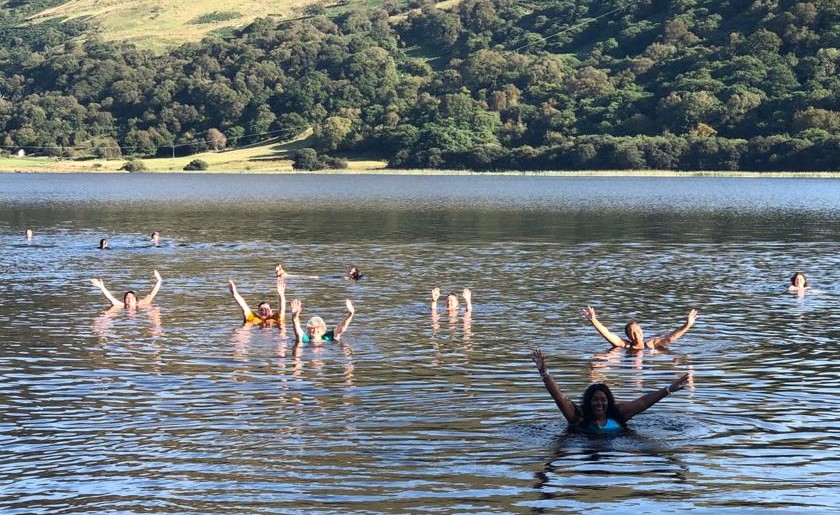
The announcement of the third national lockdown on 6 January 2021 was not the start to the year that anyone had hoped for… the rollercoaster ride of the COVID-19 pandemic, was, it seemed, still rolling on.
As the Women’s Budget Group find, COVID has had a disproportionate impact on low-income women for whom the pandemic has worsened already challenging situations ‘in terms of health, employment and unpaid work, resulting in increased levels of poverty, debt and mental health deterioration’.
Community Savers’ ability to support their communities through such profoundly challenging times in 2021 has been strengthened significantly by three grants from the We Love Manchester charity’s Stronger Communities Fund, and the Smallwood Trust’s Frontline Women (see April news) and Women Thrive funds.
We Love Manchester!
Manchester-based groups have been able to use the We Love Manchester funding to relaunch their savings meetings after the lockdown easing in March, enabling people to build up some savings again and improving mental health and wellbeing through an array of activities and events.
Mums Mart were able to relaunch their savings meetings in March and hold a fantastic AGM and family fun day in August benefiting over 100 local families leading to lots of new members. They have gone on to raise over £300 at their Christmas Fair this month where local residents were able to benefit from low-cost Christmas gifts.

Miles Platting Savers had a fantastic relaunch event in September attracting over 100 local residents and leading to an additional ten members joining. Participants celebrated with a community wall made up of drawings of the household goods and other items the Savers have been able to provide to 34 families this year through their small grants programme (via Henry Smith Charity). MP Savers are also active members in the Miles Platting Community and Age Friendly Network – MP-CAN!, which successfully merged MP Community Network and MP Age Friendly Neighbourhoods board in July this year. Members are now united behind an exciting vision for the area including a climate action plan and a community-driven social club development after the loss of many community facilities since 2007.
In Hulme, Hopton Hopefuls were able to use We Love Manchester funds to organise an “International BBQ” together with On Top of the World Project where Savers were able to share progress with tenants on their Ageing Well work for older tenants in the Aquarius estate which is driving forward a “Naturally Occurring Retirement Community” model. This has led to a new Independent Living Adviser post and will soon see recruitment of a new Development Worker to take forward the NORC model in partnership with tenants. The initiative has shaped One Manchester’s plans for supporting older tower block tenants across Hulme. Excitingly, the GMCA’s Ageing Hub has now taken up this work as a best practice case study and are exploring ways to roll out the model with housing providers across GM.

Beyond Manchester, Brinnington Savers and Arbourthorne Social Savers have done a brilliant job of keeping their savings meetings going throughout the year despite repeated challenges with COVID and a broken ankle to boot! Brinnington have been able to build on the work they have been doing supporting older residents with digital inclusion and savings accumulation to attract a £2,000 grant from Stockport Homes Community Fund – great news!
Retreat, Reflection… Recognition!
Since September, Community Savers have been on a transformative journey of retreat and reflection which was made possible by some generous donations from our fantastic supporters out there and a significant capacity-building budget from Women Thrive Fund. Thank you so much to all who have donated and to the Smallwood Trust for your ongoing faith and interest in our work!
Our two-day retreat in Snowdonia was a game-changer for the network (why retreats matter), building and strengthening relationships between women leaders (and with CLASS), deepening leaders understanding of each other’s visions and projects, celebrating our achievements, and taking home souls filled with inspiration and motivation.

This gave us the solidarity and shared purpose we needed for two really productive theory of change and strategic planning workshops with leaders in the final two weeks of September facilitated by our long-term cheerleaders Participate!

Together with all the amazing support members have provided in their neighbourhoods throughout the year, the retreat and workshops contributed directly to the wonderful recognition of our transformative potential from the Tudor Trust who have awarded Community Savers and CLASS an unrestricted grant of £40,000 per year for three years.
Savers have found dialogue with the Tudor Trust positive and enabling giving everyone an opportunity to shine. Thank-you Tudor Trust for your kind words of recognition:
“The trustees really liked the emphasis on women’s leadership and the deep recognition of community expertise which is at the heart of CLASS’s work, and which sits at the core of the Community Savers groups. They were excited by the trust, mutual support and vision for change held within the groups, and by the clear sense of connection between members of different groups […]
The trustees saw the need for an organisation like CLASS to provide the development and technical support which enables the groups to flourish and felt that governance arrangements had been carefully thought through to support genuine working in alliance with the Community Savers network. Above all there was a sense of real excitement about what the groups are doing for their communities, as well as a huge interest in seeing how things develop over the next few years. The rooted and radical nature of the work, and the group members’ ability just to get things done were also greatly appreciated!”
We look forward to getting a lot more ‘things done’ in 2022!
Go Digital!

Lorna Parks shares some reflections on her first few months as a digital inclusion volunteer with GM Savers through our Lottery-funded Go Digital! project
Just before Christmas I started working as a digital inclusion volunteer. With absolutely no experience of supporting people with technology, and by no means a tech expert myself I had no idea how this was going to go – but I was excited to get stuck into a new project.
Unfortunately, due to the latest lockdown, I found myself taking on the challenge of teaching digital skills digitally! Equipped with new tablets and laptops, community members have been getting stuck into our sessions over video calls with me. For a couple of hours every week I have been acting as a tour guide for programmes like Microsoft Word, Google Drive and Dropbox, showing off features and troubleshooting problems. This has involved having a little bit of patience with the technology, but most importantly having a laugh at the same time.
I have been working with members of the Miles Platting Savers group and have been fascinated to learn about the action they take to support their community. There is a real sense of community spirit, and a determination to learn digital skills and adapt to this increasingly virtual way of working. These digital skills sessions will enable the group to continue their work throughout whatever circumstances this year brings.
What have I enjoyed the most?
I have loved developing people’s skills, and enabling women community leaders to have the confidence to use laptops and tablets for both work and everyday things. I feel really proud of the progress the women I am working with are making, and happy to hear about them showing off their new skills to family members and other community savers members. One highlight has been one of my partners excitement on learning that she could type up new recipes on her laptop, and then look at them on the tablet when in the kitchen. The best way to get to grips with new technologies is getting stuck in, so being able to build up excitement around different ways to use it felt like a positive step forward.
What have I found the most challenging?
I felt challenged when the plan changed from meeting up in the community delivering sessions with social-distancing, to delivering them online. However, we have all risen to the challenge, and no zoom meetings have involved kicking people out, or any unkind standing orders (if you’ve missed it in the news, check out the recent Handforth Parish Council meeting!).
What would I say to others who might be thinking about doing this kind of work?
I would simply say – do it! As well as supporting others I have learnt a lot myself, and learnt loads about the work of different savings clubs across Greater Manchester. I have even done my first ever blog post!
Take away thoughts…
Digital inclusion could never be more important than it is now. I have learnt that offering support to someone struggling with aspects of their digital life can be a simple task with a big impact. Everyone is unique and has different digital needs – working at building skills together can increase confidence and knowledge for everyone involved!
Manctopia: Reality TV in a journalism jumper*
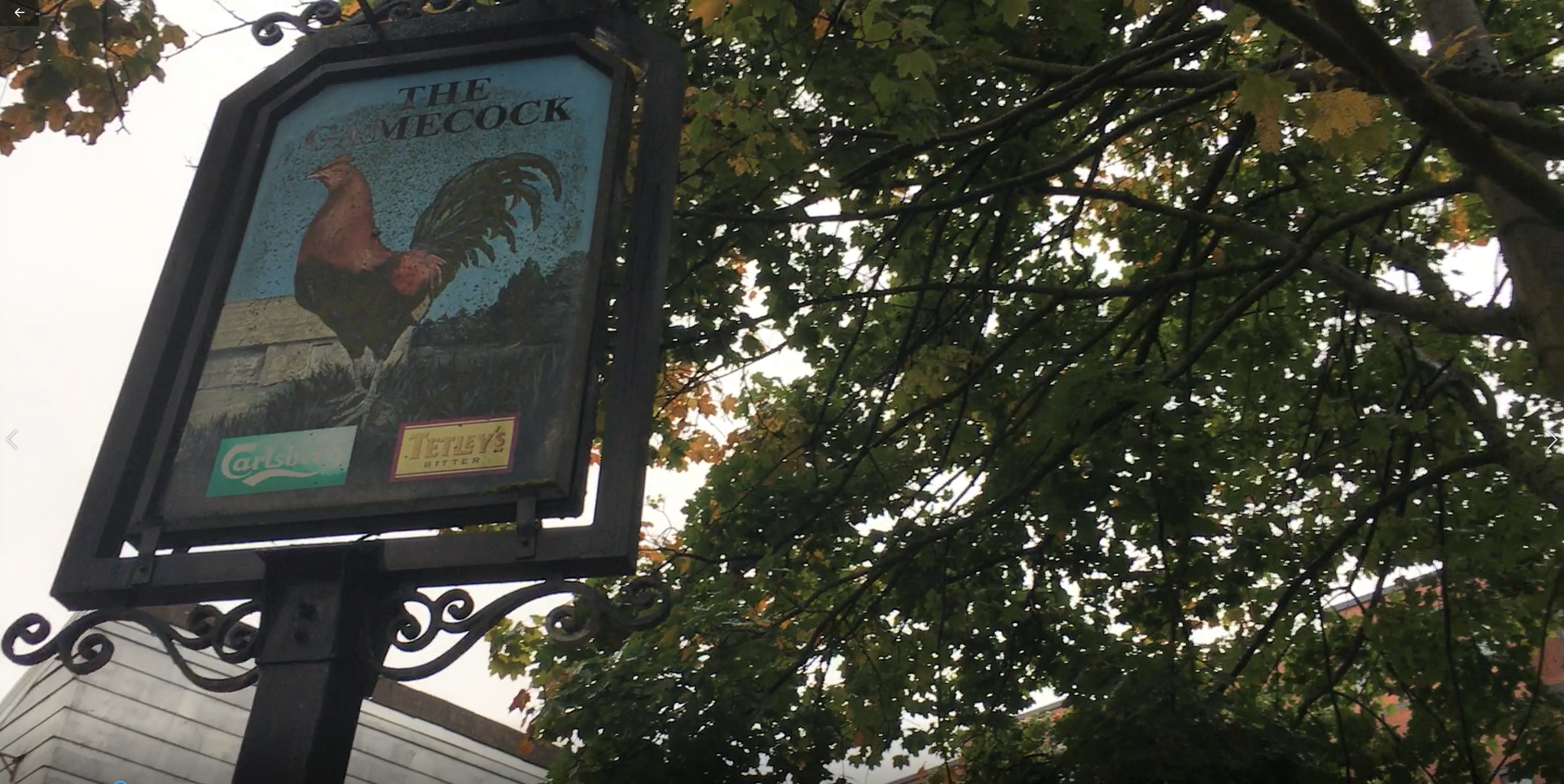
“We want Manchester to be this cosmopolitan city…but at what cost?” Judith from Lifeshare in the trailer for Manctopia
The series trailer and episode lead-ins for this 4-part BBC Two documentary that concluded on Tuesday evening are suggestive of a series seeking to analyse the inequalities associated with Manchester’s “property boom”. Instead, this glossy reality TV entrenches a misguided message that uncontrolled investor-driven urban development is the only possible trajectory. Its winners vs losers framing negatively impacts those communities experiencing the pressures of gentrification on a daily basis.
Greater Manchester Savers have contacted the BBC today about their concerns regarding the Minnow Films production ‘Manctopia’. Many tuned into the programme hoping to see some serious national journalism interrogating the underlying issues that are increasingly fragmenting communities, displacing people to outer areas of the city-region and beyond, and ultimately costing lives on the streets and through a mental health crisis.
This is not what they received. This article attempts to give voice to some of the key concerns and responses of members of inner city savings groups and their networks.
Throughout the series the audience is presented with a version of reality where investor-led urban development is the only available option for local and national government and society more widely. There is no analysis of what alternative strategies a city like Manchester can decide to pursue or of any of the challenges that may be present in the approach that has been taken to date. There is no discussion for example of Planning Obligations which provide an under-enforced mechanism through which local authorities can ensure that communities are compensated for developments and that negative impacts are mitigated. Neither is there any discussion of approaches that have been taken in other cities to avoid the profits from development being extracted out of the city instead of being made to work for the social welfare of people and communities most in need of support.
In episode three, some airtime is given to Mayor of Salford Paul Dennett who is at pains to stress the urgency for new build housing and that the City of Salford and the Greater Manchester Combined Authority have a vision for affordable housing. However, at no point is there any breaking down of what ‘affordable housing’ means in practice even when Paul Dennett tries to bring this out by talking about ‘genuinely’ affordable housing. In reality, the term is used to refer to three different types of housing provision: shared ownership, affordable rents (set at 80% of market rent), and social rent (which works out at approximately 60% of market rent). For many existing residents of the communities featured in the programme, only social rented accommodation is affordable.
Here, some of the members of the GM Savers network share their responses to the programme in person:
Tina Cribbin in Hulme talks about stigmatisation, the absence of alternative strategies presented, and the poor diversity of experience covered by the programme.
Roy Bennett in Hulme wishes the programme could have looked at the way that development happens without any plans being made for how to protect sufficient land for community facilities and appropriate housing for older people:
Sue, Dot and Christine in Miles Platting and Collyhurst discuss how the programme failed to represent the experiences and needs of households and families like theirs currently living in social housing or to educate us about the reasons for so much housing becoming privatised and unaffordable.
Thelma McGrail, who appears in the programme briefly, is concerned about having been provided with a misleading explanation of what the programme was going to be about, and the stigmatising portrayal of the Miles Platting community during the programme.
Ellie Trimble, local resident and Church of England Rector in Miles Platting, who was engaged by the programme makers but became worried about their approach, shares her concerns about the unrepresentative and simplistic presentation of homelessness and temporary accommodation.
People have shared how important it was that Anne and Donna and other local residents were able to raise the profile of experiences on the Osborne estate under the Northern Gateway regeneration process in the final episode. However, Greater Manchester Savers feel that ultimately, there was inadequate analysis of the local, national and international factors that are shaping the current housing crisis and resulting in people being displaced from the city. Some history was featured but without any unpacking of the reasons behind those histories. The community leaders who have commented feel that the repeated presentation of various (sometimes deeply offensive) individual perspectives, with no qualification or discussion, when dealing with issues of such critical importance to people’s physical and mental wellbeing, is unacceptable. They feel most strikingly that disproportionate airtime has been given to the perspective of a single millionaire developer and a number of unrepresentative caricature features such as that on the wealthy fashion designer who needs extra bedrooms for her shoes.
At a time of national crisis, when the effects of ten years of austerity policies have combined with an as yet uncontrolled pandemic to exacerbate poverty and health inequalities in some of the most hard-hit communities in the city (and the country), Greater Manchester Savers consider the airing of this series to have been misjudged and the nature of its directorial narrative to be misleading and unrepresentative. The suggestion that the main focus of the programme may not have been properly and clearly explained to some of the individuals interviewed (see Thelma’s contribution) is also concerning.
In their editorial guidelines, the BBC commits to:
- covering subject matter in such a way ‘so that no significant strand of thought is under-represented or omitted’
- ‘always scrutinise arguments, question consensus and hold power to account with consistency and due impartiality’
- ‘offering our audiences choices about how to confront’ [the issues they are covering within their programming]
Greater Manchester Savers question whether these guidelines have been adhered to in the making of Manctopia.
*‘Capitalists in Anarchist Jumpers’ is a poem by Tina Cribbin published in her 2019 collection Classphemy. This article has been written by Sophie King at CLASS in consultation with, and on behalf of, members of GM Savers and their local networks in response to concerns they have raised about the programme.
Dot the do-er!

In the first of a series of articles looking at the experiences of some of our members during lockdown, Rowena Harding asks Dot Lomax what has been happening in Miles Platting.
“If you want to find something to do in the community you will find it,” says Miles Platting resident, Dot.
Dot, by her own definition is a resident that does things in the community. She’s a member of one of the first GMS groups to set up – Miles Platting Savers. She is now also using that experience to support Ridgway Street Savers as a committee member. She’s a regular at the community garden and she is also involved in Many Hands Craft Collective, Monday Movers at St Georges Youth and Community Centre, and a new collective of local groups called Miles Platting Community Network.
Dot has been keeping busy during the lockdown, helping to put together food parcels with other Ridgway Street Savers working with Reverend Ellie Trimble at the Parish Church of the Apostles. She’s especially keeping an eye on those who used to come to the Friday coffee morning at the Apostles where the Ridgway Street Savers began. The coffee morning was a place where local residents could enjoy each other’s company, have a laugh and sometimes even a bit of a dance – but people could also take home a few items of food. Now, they lack the company of the gathering and a convenient way to stock up on essentials. Most members are older and have underlying health conditions. Sadly, three members of the group have passed away in recent weeks. “The loss feels bigger somehow”, explains Ellie, “because the group have not been able to honour their lives together and some of them have been meeting up for twenty years or more”.
Dot says she’s lived in the community all her life, and together with Ellie at the Apostles and other volunteers, they have been keeping in touch with as many residents as possible during the pandemic’s lockdown. “We’ve got phone numbers and people know and trust us so they ring if they need anything. Ellie puts letters through the doors and there’s a magazine (from housing association Adactus) that comes through people’s doors.”
But Dot worries about people who don’t reach out for help. “There’s people falling through the net,” she says “More people need support. We are still missing out people who are not coming forward. There is lots of pride and people will say ‘keep it for people who really need it’. How do we get in touch with those people? There are a lot of people struggling.” The Miles Platting Community Network are discussing these questions now to see what more can be done.
Dot assures her 4-year-old granddaughter living across the way that she is doing ok every time she sees her. But Dot knows there are people out there who are not. How to reach those people?
That’s the million-dollar question that’s become even more important now that the pandemic has given people more reason to stay behind closed doors.
